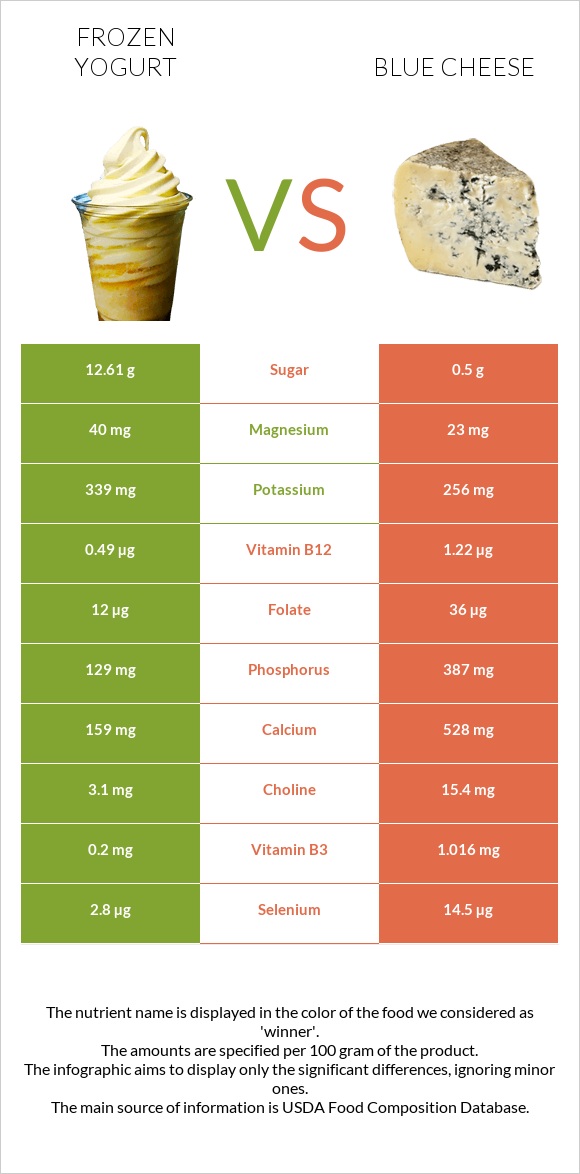Frozen yogurt vs. Blue cheese — In-Depth Nutrition Comparison
Compare
How are frozen yogurt and blue cheese different?
- Frozen yogurt is higher in copper; however, blue cheese is richer in calcium, phosphorus, vitamin B12, selenium, zinc, and vitamin B2.
- Daily need coverage for saturated fat for blue cheese is 91% higher.
- Frozen yogurt contains 5 times more copper than blue cheese. While frozen yogurt contains 0.203mg of copper, blue cheese contains only 0.04mg.
- Frozen yogurt has less sodium.
Yogurt, frozen, flavors not chocolate, nonfat milk, with low-calorie sweetener and Cheese, blue are the varieties used in this article.
Infographic

Infographic link
Mineral Comparison
Mineral comparison score is based on the number of minerals by which one or the other food is richer. The "coverage" charts below show how much of the daily needs can be covered by 300 grams of the food.
| Contains more MagnesiumMagnesium | +73.9% |
| Contains more PotassiumPotassium | +32.4% |
| Contains more CopperCopper | +407.5% |
| Contains less SodiumSodium | -92.9% |
| Contains more CalciumCalcium | +232.1% |
| Contains more IronIron | +675% |
| Contains more ZincZinc | +442.9% |
| Contains more PhosphorusPhosphorus | +200% |
| Contains more SeleniumSelenium | +417.9% |
Vitamin Comparison
Vitamin comparison score is based on the number of vitamins by which one or the other food is richer. The "coverage" charts below show how much of the daily needs can be covered by 300 grams of the food.
| Contains more Vitamin CVitamin C | +∞% |
| Contains more Vitamin B1Vitamin B1 | +37.9% |
| Contains more Vitamin AVitamin A | +9800% |
| Contains more Vitamin EVitamin E | +212.5% |
| Contains more Vitamin DVitamin D | +∞% |
| Contains more Vitamin B2Vitamin B2 | +112.2% |
| Contains more Vitamin B3Vitamin B3 | +408% |
| Contains more Vitamin B6Vitamin B6 | +315% |
| Contains more Vitamin B12Vitamin B12 | +149% |
| Contains more Vitamin KVitamin K | +700% |
| Contains more FolateFolate | +200% |
| Contains more CholineCholine | +396.8% |
All nutrients comparison - raw data values
| Nutrient |  |
 |
DV% diff. |
| Saturated fat | 0.488g | 18.669g | 83% |
| Sodium | 81mg | 1146mg | 46% |
| Fats | 0.8g | 28.74g | 43% |
| Calcium | 159mg | 528mg | 37% |
| Phosphorus | 129mg | 387mg | 37% |
| Vitamin B5 | 1.729mg | 35% | |
| Protein | 4.4g | 21.4g | 34% |
| Vitamin B12 | 0.49µg | 1.22µg | 30% |
| Cholesterol | 4mg | 75mg | 24% |
| Vitamin A | 2µg | 198µg | 22% |
| Selenium | 2.8µg | 14.5µg | 21% |
| Zinc | 0.49mg | 2.66mg | 20% |
| Monounsaturated fat | 0.205g | 7.778g | 19% |
| Copper | 0.203mg | 0.04mg | 18% |
| Vitamin B2 | 0.18mg | 0.382mg | 16% |
| Calories | 104kcal | 353kcal | 12% |
| Vitamin B6 | 0.04mg | 0.166mg | 10% |
| Fiber | 2g | 0g | 8% |
| Carbs | 19.7g | 2.34g | 6% |
| Folate | 12µg | 36µg | 6% |
| Polyunsaturated fat | 0.03g | 0.8g | 5% |
| Vitamin B3 | 0.2mg | 1.016mg | 5% |
| Magnesium | 40mg | 23mg | 4% |
| Vitamin D | 0µg | 0.5µg | 3% |
| Vitamin D | 0IU | 21IU | 3% |
| Iron | 0.04mg | 0.31mg | 3% |
| Potassium | 339mg | 256mg | 2% |
| Vitamin K | 0.3µg | 2.4µg | 2% |
| Choline | 3.1mg | 15.4mg | 2% |
| Vitamin C | 0.7mg | 0mg | 1% |
| Vitamin B1 | 0.04mg | 0.029mg | 1% |
| Vitamin E | 0.08mg | 0.25mg | 1% |
| Net carbs | 17.7g | 2.34g | N/A |
| Sugar | 12.61g | 0.5g | N/A |
| Manganese | 0.009mg | 0% | |
| Tryptophan | 0.312mg | 0% | |
| Threonine | 0.785mg | 0% | |
| Isoleucine | 1.124mg | 0% | |
| Leucine | 1.919mg | 0% | |
| Lysine | 1.852mg | 0% | |
| Methionine | 0.584mg | 0% | |
| Phenylalanine | 1.087mg | 0% | |
| Valine | 1.556mg | 0% | |
| Histidine | 0.758mg | 0% |
Macronutrient Comparison
Macronutrient breakdown side-by-side comparison
Protein:
4.4 g
Fats:
0.8 g
Carbs:
19.7 g
Water:
73.5 g
Other:
1.6 g
Protein:
21.4 g
Fats:
28.74 g
Carbs:
2.34 g
Water:
42.41 g
Other:
5.11 g
| Contains more CarbsCarbs | +741.9% |
| Contains more WaterWater | +73.3% |
| Contains more ProteinProtein | +386.4% |
| Contains more FatsFats | +3492.5% |
| Contains more OtherOther | +219.4% |
Fat Type Comparison
Fat type breakdown side-by-side comparison
Saturated fat:
Sat. Fat
0.488 g
Monounsaturated fat:
Mono. Fat
0.205 g
Polyunsaturated fat:
Poly. Fat
0.03 g
Saturated fat:
Sat. Fat
18.669 g
Monounsaturated fat:
Mono. Fat
7.778 g
Polyunsaturated fat:
Poly. Fat
0.8 g
| Contains less Sat. FatSaturated fat | -97.4% |
| Contains more Mono. FatMonounsaturated fat | +3694.1% |
| Contains more Poly. FatPolyunsaturated fat | +2566.7% |